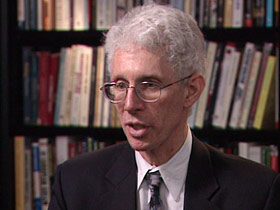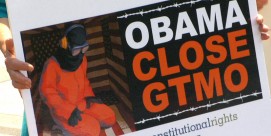In This Episode << SLIDE LEFT TO SEE ADDITIONAL SEGMENTS
William Galston Extended Interview
Read more of Kim Lawton’s interview about Iraq and just war with William Galston, a senior fellow in the governance studies program at the Brookings Institution in Washington, DC:
Q: Have you changed your thinking about whether the war was morally justified?

A: I have not changed my thinking about the moral justification of the war. When I began thinking about these problems shortly after President Bush’s West Point speech in June of 2002, it seemed to me that the critical question then and now was the distinction between a preemptive war on the one hand and a preventive war on the other.
A preemptive war is justified when there is a demonstrable, imminent threat. There is a long history of just war theory that supports the right of a nation to preempt against threats of that sort. There is very little theory or modern moral argument that supports a preventive war, when the threat is more distant in time and more speculative. In my judgment four years ago and in my judgment today, the war against Iraq was a preventive rather than a preemptive war, and therefore the burden of proof is very much on those who would try to justify such a war.
Q: What are some of the consequences of acting on that basis?
A: It is inherently risky to take an action based on distant and speculative harms. Compare that to the more mainstream and more justifiable case. If one nation attacks another, as Iraq attacked Kuwait in the early 1990s, the entire world can see what happened, who was the aggressor, the moral basis for a response against the aggressor, at a minimum to force the aggressor to cough up his ill-gotten gains. That moral case makes itself. In many cases of preemption, it is perfectly clear to all that a country, let us say, is mobilizing its troops on a border, or is making dire threats against another nation, or is on the verge of taking an action that would amount to a declaration of war, which the Egyptians were on the verge of taking, indeed did take, prior to the 1967 war, the famous Six-Day War.
When you’re talking about a preventive war, on the other hand, the burden of proof is on you to demonstrate knowledge of these prospective future ills. If you say, “We are sure that such-and-so is the case,” and then such-and-so turns out not to be the case, which is what happened with Iraq, then your credibility as a nation is diminished. Why does that matter? Because so much of the world runs on trust, or at least degrees of trust, and let me tell you a story about that. In the days before the Cuban missile crisis in 1962, President Kennedy was trying to mobilize as much international support as possible. He sent an envoy as part of that process to see then-President Charles de Gaulle of France. The envoy told President de Gaulle of the imminent threat, and at some point in the conversation said, “Mr. President, I have the proof right here in my briefcase.” Kennedy’s envoy started to open his briefcase. President de Gaulle put up his hand and said, “No need. The word of the President of the United States is all that the President of France needs.”
I would submit that presidents around the world [and] prime ministers around the world are a lot less likely to say that today than they were 44 years ago or four years ago, and that is a problem. It’s a moral problem, but it’s also a practical problem for the conduct of American foreign policy. We face threats around the world — from North Korea, from Iran, perhaps in the future from China or other nations. In order to get support for what we need to do, other countries are going to need to believe what we say and have confidence in the information that we put before them, and I am afraid that our ability to do that has been impaired for some time to come.
Q: And you’re calling that a loss of moral credibility.
A: I’m calling what has happened as a result not only of what we did in Iraq but [also of] how we justified it before the world, I am calling the failure of events to bear out our case for going to war a loss of moral credibility, and therefore of moral authority, and therefore of operational capacity in future foreign policy.
Q: What about how the war has been conducted? Do you also have concerns from a moral and ethical standpoint about that?
A: I believe that the United States government and the United States military did a reasonably good job of employing means that were proportional to the ends that they sought, at least at the beginning of the war. I believe that there are some issues that deserve serious moral inquiry concerning civilian deaths. The extent to which they were unavoidable as incidents of war, and the extent to which they represented avoidable collateral damage that a different selection of tactics might have at least reduced, if not eliminated altogether — that is a serious issue having to do with the conduct of the war itself. And, clearly, more serious and urgent moral issues have been raised by the conduct of U.S. forces and the forces in Iraq with which we’ve been allied in the aftermath of the war, and in particular issues having to do with the treatment of prisoners. And we’re going to be arguing about that one for a long time to come.
I personally believe that it’s very regrettable that peoples and nations around the world got the impression that the use of torture was an optional, debatable issue in the United States. I don’t think our moral authority has been enhanced by that debate, let alone the sorts of images that have been flashed around the world, so those are serious operational questions. I think, though, that they are less serious than the threshold question of going to war under justifiable or not justifiable premises.
Q: Some make the argument that the benefits, the outcome will be better in the long run — without Saddam, without the oppression that was there. The people will in the long run be better off, and therefore war was morally justifiable. How do you respond to that?
A: First of all, it’s going to take a long time to figure out how this is going to come out. I am happy to affirm that the best of all possible outcomes — Iraq in the long run will turn into a stable constitutional democracy that respects the rights of all of its individual citizens and all of its different ethnic groups — that would be a terrific outcome. At the other end of possibility is civil war, the disintegration of the country, years if not decades of bloody ethnic cleansing. Nobody can sit here today and tell you which one of those outcomes 20 or 30 years from now is more likely. If you’re talking about 20 or 30 days from now, it’s clear which one is more likely. The problem with long-term cost-benefit calculation is it is inherently difficult to make prospectively.
But that’s only the first problem with that argument. The second problem with that argument is that just war theory is not just a cost-benefit theory; it’s not just a calculation of consequences. It’s also the employment of principles, principles that involve not a prediction about the future but facts about the present, and so it’s a mistake to believe that cost-benefit calculations can wipe out the importance or the continuing efficacy of principles that have to be applied here and now. As a matter of fact, I would say it is precisely the difficulty of projecting long-range consequences that gives strength to the focus of just war principles on things that citizens and leaders can see right here and right now.
Q: If the U.S. was not morally justified to invade Iraq, the U.S. is there now. What ethical principles should be considered as the country figures out what to do next? What are the standards that should be applied in thinking through the right thing to do now?
A: There are three categories of moral considerations that I think we have to bear in mind in trying to figure out not just where our advantage lies, but what our duties are in Iraq right now, regardless of the rightness or the wrongness of the principles that got us there.
Number one, according to international law, as an occupying power, which we still are de facto even if de jure we’ve handed off authority to an elected Iraqi government, we have incurred certain international obligations having to do with the treatment of citizens, the provision of basic services. It’s a long list, and we can’t forget that. It’s not just nice to have water running and electricity and basic food supplies and things of that sort; it is part of our responsibility as the most responsible power in the country.
Secondly, we are clearly supporting certain forces in Iraq against certain other forces in Iraq. We incur a responsibility for the behavior of the people with whom we’re allied, and that’s why it was morally alarming, as well as politically and humanly, when it appeared that some of the death squads were functioning within the interior ministry, in the framework of a government and a governing authority that we were helping, as the parlance goes these days, to “stand up.” So we are partly implicated in that and, I believe, have a duty to ferret out the wrongdoers and try to put a stop to such things.
Here’s the third category of moral responsibilities, and it is the one that troubles me the most personally, and that is the question of what will happen in the case of a precipitated U.S. withdrawal from Iraq. Let me tell you why this is so difficult. There are some experts who say that the U.S. forces are the only thing between Iraq and a bloody, full-out civil war. We obviously have a low-level internal conflict going on now, which is, perhaps, an intermediate-level conflict with 20 or 30 or 50 bodies, Sunni or Shiite, turning up every day bound, gagged, slaughtered. There are other experts who say that it is U.S. forces and their large footprint that are catalyzing this struggle and that if we were to draw down or to withdraw, the Iraqis would look around and see that they have only themselves to hold responsible for whatever is happening in their country, and they are going to have to come to some sort of agreement, and in a way our continued presence is enabling them not to come to that agreement.
I am not a lifelong expert in the Middle East or in Iraq. I, personally, as a scholar, part-time moral philosopher, have no idea which of those two claims is the more credible. I do know this — that our policy makers have an urgent duty to assess the credibility of those claims and to shape their actions in accordance with them. They cannot ignore one way or the other the implications of staying or going on a timetable, and that is one of many questions that ought to be brought to bear on the question of whether or not we should declare a timetable and then act on that basis.
Q: Does just war theory have anything to contribute to weighing those possibilities?
A: I think people are now more aware than they were five or 10 years ago that just war theory traditionally has been divided into two parts: the justice of the war and then justice in the conduct of the war. But there’s really a part three, isn’t there, or there should be — namely, justice in the wake of the war. What sorts of obligations do you incur to those on whom you’ve made war?
There’s some thinking about that. Obviously, the law is guided by basic moral principles and elementary human decency in talking about what you as the occupying power are required to do and [are] prohibited from doing, but it’s clearly a broader set of considerations than that. We need to think hard about the minimal level of order that we are morally required to leave behind, if it’s in our power to affect that. That’s another perplexity. Maybe our presence or our absence would not be the critical variable at all in determining how the Iraqis choose to deal with their own affairs and whether they choose to come to terms with one another in our presence or in the aftermath of our presence.
This is an illustration of a broader fact about moral reasoning. It’s not the case that the moral argument is up here and the way the world actually is is down here and that the moral and the empirical never come together. In the real world they always come together. Moral argument about public policy and politics and foreign affairs is inherently dicey, is inherently difficult, because it will rely on certain premises about the way the world is, the way the world will be, cause-and-effect relationships, some of which are assumed to be true, some of which have some evidence behind them, very few of which have a preponderance of evidence, let alone evidence beyond a reasonable doubt, the standard that one would need in a criminal court. You always sort of cross your fingers, hold your breath, and say a prayer when you’re bringing these moral arguments to bear on issues as grave as war and peace.
Q: Have ethicists and faith communities had an adequate impact on such thinking in the face of the complexities of the modern world?
A: I cannot possibly speak for all faith communities in the United States. I do think that there was a period during which it was assumed that a lot of the fundamental problems had been resolved and that we could in effect build moral propositions that were known with adequate certainty into structures of international law, and that would give us the answers to our questions. I think we’re becoming aware of the fact — and in the United States this awareness began growing during and in the immediate aftermath of the Vietnam War — that as a great power we are going to be called upon or [are going to] call upon ourselves to discharge a range of responsibilities around the world, and that as a country we needed to think harder about the threshold questions of justification for one assumption of responsibility as opposed to another, and also to think harder about how we should conduct ourselves once we’re drawn into such a struggle, whether for good reasons or not such good reasons. So whatever you thought about the justification of the war in Vietnam, for example, it became clear a few years into the war that the tactics we were employing, some of which appeared necessary and proper at the time, were raising serious ethical and moral questions, and in the aftermath of the war I think those facts became clearer and clearer.
There is, it seems to me, another category of questions much vaguer than that which a great power necessarily needs to take into account. We are like the elephant tromping around in the forest. In the nature of things, every time we pick our foot up and put it down, we’re going to be crushing or disturbing a lot of things, many of which we won’t even see because they’re too small relative to the size of this great U.S. elephant. And there is, for that reason, I believe, an element of caution that ought to guide our action. It is more necessary for us to be cautious than it is for Belgium to be cautious, because if we accidentally misuse our power, if we act on the basis of questionable premises, the amount of damage those actions can produce is really enormous.
That doesn’t mean we should be hamstrung from acting in all cases, because there are many circumstances in which the failure to act is the most damaging decision one can make. But we have an obligation, it seems to me, to think not only about the outcome that we most desire but also about the range of other possibilities, the worst case outcome. In the case of Iraq, there were people inside the government who were warning at the time that there are a range of possible outcomes, at least in the short-to-medium term, some of which were going to be very unattractive, and that if we decided to go forward it should be with full recognition of that fact. Instead, I think both at senior levels and also because among the people as a whole there was a sense of excess confidence — that if only the United States were firm and decisive, if we brought to bear our unparalleled military with its technology, with its extraordinary degree of training,- we would achieve not only our short-term objectives but also our longer-term objectives, and that the risk of results worse than that — those risks were minimal.
That wasn’t true. It is never true, and we have to act with a due measure of caution, for that reason, as a great power.







